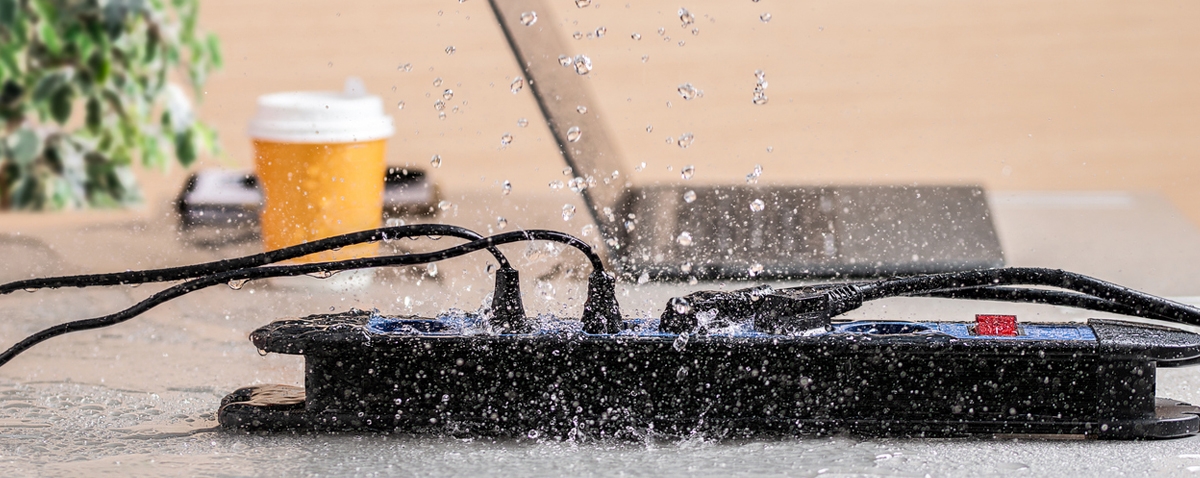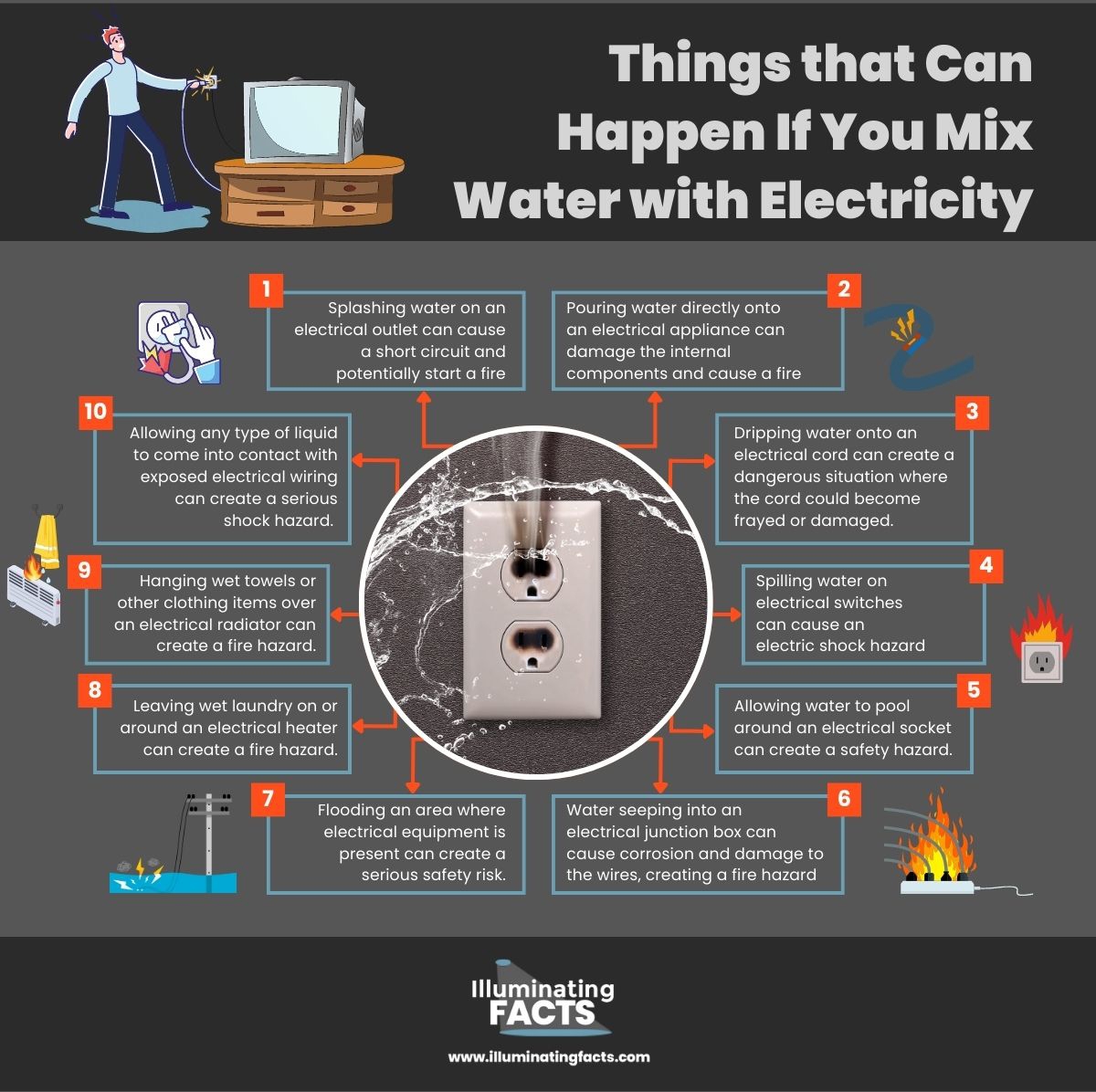Introduction
Water in its pure form does not contain any salt or other impurities and cannot conduct electricity [1]. However, you won’t find pure water naturally because it’s a universal solvent liquid that can dissolve most minerals, chemicals and other substances. Pure water is something that can be produced in a laboratory. Even commonly available distilled or deionized water also contains some ions.
What Makes Water a Conductor?
In the context of conducting electricity through water, this post refers to natural water that contains impurities. What makes water a conductor of electricity are the ionic compounds such as salts (sodium chloride, magnesium, sulfate etc.) that allow water to carry electrical charge. Since water is an excellent solvent, it easily dissolves these salts and other substances that are not visible to the naked eye.
When an electrical charge is applied to water, ions are attracted to the oppositely charged electrodes and begin to flow through water. This polarization of ions allows an electric current to pass through water. The higher the amount of dissolved salts, the more conductive water becomes. Ions are present in water that occurs naturally, so it’s safe to assume that natural water can conduct electricity.
Water and Electricity: A Deadly Combination
Mixing water and electricity can potentially have deadly consequences, which mainly depends on the source of electricity (Voltage and Current in Amps). For example, dropping a 1.5 Volt AAA battery in water will not result in any noteworthy event, but dropping a running hairdryer in a bathtub is a totally different story.
The general rule of thumb is to treat the combination of water and electricity as extremely dangerous because one might not be aware of all the variables that might come into play when water is mixed with electricity. Complacency in any kind of electrical work can be fatal and should be avoided at all costs.
Things that Can Happen If You Mix Water with Electricity
Electrocution in water refers to coming in contact with water that is in contact with live electrical wiring or an electrical appliance connected with the power source. In such situations, the victim becomes part of the circuit with electricity flowing through him/her, which can paralyze muscles, cause unconsciousness and even result in a fatality. Following are the ten most common things that can happen when water comes into contact with electricity.
- Splashing water on an electrical outlet can cause a short circuit and potentially start a fire
- Pouring water directly onto an electrical appliance can damage the internal components and cause a fire
- Dripping water onto an electrical cord can create a dangerous situation where the cord could become frayed or damaged, causing a potential shock hazard
- Spilling water onto an electrical switch can create a risk of electrocution if someone tries to turn the switch on while it is still wet
- Allowing water to pool around an electrical socket can create a safety hazard as it increases the risk of shock if someone comes into contact with the water while trying to plug in or unplug an appliance
- Water seeping into an electrical junction box can cause corrosion and damage to the wires, creating a fire hazard
- Flooding an area where electrical equipment is present can create a serious safety risk as the water can short-circuit the equipment and start a fire
- Leaving wet laundry on or around an electrical heater can create a fire hazard as the moisture in the laundry can conduct electricity and cause a spark
- Hanging wet towels or other clothing items over an electrical radiator can create a fire hazard, as the damp fabric can easily catch fire if it comes into contact with the heat source
- Allowing any type of liquid to come into contact with exposed electrical wiring can create a serious shock hazard. Always keep electrical wiring dry and away from any type of water source
Electric Shock Drowning
Electric shock drowning or electrocution in water refers to coming into contact with water that has electricity flowing through it due to faulty wiring/poorly maintained equipment. When a person enters such bodies of water, they become a path through which the current can flow, often resulting in paralysis and unconsciousness. Electric shock drowning is a public safety threat because the risk of electrocution also lurks in the waters of a swimming pool or a lake. Common causes of electric shock drowning include:
- Faulty electrical wiring on docks and boats, which can release electric current into water. Someone swimming or walking near that area can get electrocuted
- Faulty wiring or electrical equipment inside a swimming pool such as water pumps, lights, vacuums and filters (or wiring and equipment that has not been inspected for a long time)
- No Ground-Fault Circuit-Interceptors (GFCI) [3] for electrical equipment used in swimming pools
- Exposed fixture wires
- Collusion with a transmission lines passing through water (lakes, large water bodies or during floods)
- Metal objects in water that might come in contact with a power source
Symptoms and Precautions
Common symptoms of electric shock drowning include a tingling sensation, muscle cramps, difficulty concentrating or moving and panicked behavior. If you see someone unsettled, is having difficulty moving or other swimmers are moving away from a certain area, then call emergency services or seek help locally. Flickering or intermittently working underwater pool lights are a sign of danger and should be taken seriously. If you encounter any common causes of electric shock drowning mentioned above, report them to the relevant authorities or owners. This allows them to fix the issue before it becomes a life threat. Precautions [4] you can take to avoid electrocution in water include:
- Swim back immediately if you feel even the slightest tingling sensations and report it to the owner
- Do not take support of a metal object while exiting water
- Do not jump in to rescue (if you suspect someone is getting electrocuted)
- If the victim is close enough, extend a rod made of a non-conductive material such as plastic or a fiberglass rod
- Immediately try to turn off the power source from where you suspect the current is coming from
- Avoid swimming when there is a thunderstorm and during rain. Storm surge is also deadly, which floods large areas in a short time [5]
- Use appliances that run on batteries near the pool
- Keep children under supervision when near water bodies
What Does Electrocution Feel Like?
Electrocution is different and much more serious than common ‘shocks’ in which you can pull away immediately. Electrocution is on a totally different level and it might take some seconds before you even realize what’s happening, which is usually too late. When electricity passes through a body, the brain loses control over muscles because electricity takes over that job, making it very difficult to move or get away due to cramped muscles.
Visually, victims have defined it like driving in pitch black through a blizzard with white strobe light splatters. You lose vision of your surroundings and all you hear are mechanical crackling sounds, while loss of control over your body makes it difficult to come out of this situation. Although victims usually don’t experience severe physical pain during electrocution, they feel severe pain in muscles and chest when it’s over and if they survive.
Conclusion
If you are in an area where there is a risk of electrical charges in the water, it is important to be careful. Avoid swimming in or wading through water that may be electrically charged, and don’t touch any metal objects that may be in the water. If you must touch them, make sure that you are wearing rubber gloves or other protective clothing. The same applies to other appliances we use, which should never come in contact with water.
Natural water has the ability to conduct electricity, and if there is a current running through it, it can cause serious burns or even death [4]. There is no better strategy than to take precautionary measures when dealing with electricity near water. If you come into contact with electrified water, get out of it as quickly as possible and seek medical help immediately. Poorly maintained equipment or faulty wiring can leak current into water, including wires near swimming pools where the risk of electrocution might be lurking right below your feet.
References
- https://www.usgs.gov/special-topics/water-science-school/science/conductivity-electrical-conductance-and-water#overview
- https://www.betterhealth.vic.gov.au/health/healthyliving/electric-shock#what-is-electric-shock
- https://ehs.utk.edu/index.php/2021/02/18/water-and-electricity-dont-mix/
- https://www.commerce.wa.gov.au/sites/default/files/atoms/files/electric_shocks_0.pdf


